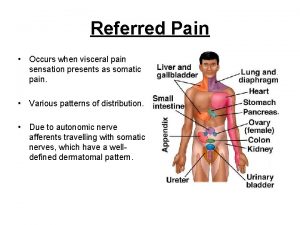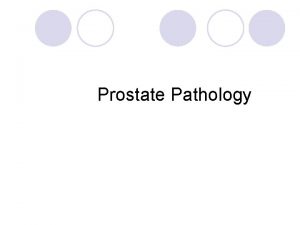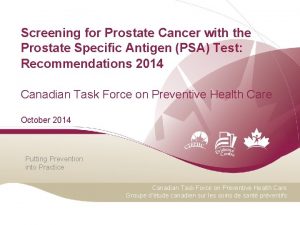The Dawn of a New Era for Prostate
















- Slides: 16

The Dawn of a New Era for Prostate Cancer Patients: The Role of PSMA and Artificial Intelligence in Diagnostics and Therapy Asha Das, MD Chief Medical Officer October 2019

Our Mission FIND FIGHT AND FOLLOW® Leading Development of Radiopharmaceuticals to Detect and Treat Cancer 2 3 HSA iobenguane I 131 for Ultra Orphan neuroendocrine tumors (NET) Prostate-specific membrane antigen (PSMA) – Portfolio for Prostate Cancer Treatment for adults and pediatric patients 12 years and older with iobenguane scan positive, unresectable, locally advanced or metastatic pheochromocytoma or paraganglioma who require systemic anticancer therapy Imaging and therapeutics agents designed to improve diagnosis, treatment and monitoring of prostate cancer

Robust Product Pipeline Preclinical Phase 1 Phase 2 Phase 3 Filing Marketed ULTRA-ORPHAN RADIOTHERAPEUTIC HSA iobenguane I 131 Metastatic Pheochromocytoma & Paraganglioma PROSTATE CANCER Py. L™ PSMA-targeted PET Imaging Agent Developed in the US by Progenics Licensed in Europe to 1095 PSMA-targeted Small Molecule Therapeutic 1404 PSMA-targeted SPECT/CT Imaging Agent PSMA TTC PSMA-targeted Thorium Conjugate Therapeutic PSMA AI Automated reading of PSMA-targeted imaging based on AI and deep learning a. BSI Automated Bone Scan Index OPIOID-INDUCED CONSTIPATION TREATMENT RELISTOR® SC Opioid-induced Constipation RELISTOR® Tablets Opioid-induced Constipation 3 Licensed in Europe to

PSMA-Targeted Pipeline

Progenics’ advancement of PSMA imaging program has been powered by Academic Collaboration Py. L Research Access Program™ (RAP) begins providing Py. L to authorized prostate cancer researchers Progenics collaborates with academic investigators on clinical development of HSA iobenguane I 131 and PSMA targeted radiopharmaceuticals 1404 -SPECT and 1095 August 2015: Johns Hopkins University recognizes Progenics’ focus on cancer imaging and licenses Py. L™ to Progenics MIP Acquisition 5 Py. L Phase 3 CONDOR study completed enrollment and read out expected year end 2019 Py. L Phase 2/3 OSPREY study concludes supporting advancement in Phase 3. 2013 MIP Academic institutions in RAP use Py. L in their own Investigator Initiated Trials and publish independent research Progenics acquires EXINI for its technology (developed at academic institutions in Sweden) to become leader in prostate cancer AI

Py. L™: PSMA-targeted PET/CT Agent “Physicians indicated that imaging results improved decision-making in 89. 1% and changed management plans in 87. 3%. ” Rousseau, E. et al, JNM 2019 – Enables visualization of both bone and soft tissue metastases – Highly specific to prostate cancer cells, not confounded by degenerative or inflammatory conditions – Very high standardized uptake values (SUV) even in small lesions – Identified more lesions than conventional imaging Image from OSPREY Study 6

Py. L OSPREY trial results support advancement into Phase 3 • Demonstrated high sensitivity in detecting distant metastatic prostate cancer lesions • Demonstrated high specificity in confirming the absence of pelvic lymph node disease *median of three independent readers • Associated strong positive predictive values (PPV) and negative predictive value (NPV) of Py. L imaging 7

Py. L OSPREY Results Supported Advancement into Pivotal Phase 3 CONDOR Trial Objective: To evaluate the diagnostic performance & clinical impact of 18 F-DCFPy. L PET/CT imaging in patients with suspected biochemical recurrence (BCR) of prostate cancer Primary Endpoint: Correct Localization Rate (CLR), defined as percentage of subjects with a one-to-one correspondence between localization of at least one lesion identified on 18 F-DCFPy. L PET/CT and the composite truth standard. 14 sites in the US and Canada | Total subjects: N=208 Py. L Development Timeline 2018 CONDOR Phase 3 2019 First Patient Dosed Enrollment Completed November 2018 August 2019 2020 Topline Results* Q 4 2019 NDA Submission* IND Filed October 2016 2021 Approval* July 2020 Enrollment completed August 2019; Topline data expected by YE 2019 8 * Indicates anticipated events based on the company’s expectations. H 2 2021

Py. L™ PSMA-targeted PET/CT Agent 12 ongoing investigator-initiated trials (IIT) supported by Progenics Pharmaceuticals as part of the Progenics Py. L Research Access Program™ To initiate an IIT using Py. L for PET imaging, Submit a proposal or inquiry at Py. LAccess@Progenics. com 9

KOLs Drive Development of Py. L Leveraging investigator-sponsored studies to expand advance Py. L development Stanford University School of Medicine The Journal of Nuclear Medicine – This 50 -patient study reported that Py. L imaging localized disease in the majority of patients, including those with very low PSA levels – Data from a Prospectively Designed Independent Trial of 130 Patients showed that Py. L upstaged and downstaged disease in 65. 5% of patients, improved physician decisionmaking in 89. 1% of patients, and changed management plans in 87. 3% of patients 2 – Py. L imaging had an impact on clinical management in 65% of the patients, including 25% who had negative findings with conventional imaging 1 10 References: 1. Harrison et al 2019 J Urol 201(4 S): e 1002 (abstract #: LBA-22). ; 2. Rousseau et al 2019 J Nucl Med 2019; doi: 10. 2967/jnumed. 119. 226381

PSMA Artificial Intelligence (AI) may provide faster, more accurate image analysis compared to a human reader alone Demonstrated clinical utility of PSMA AI 65 year old male with m. CRPC with PSA of 6. 8 ng/ml – Prospectively planned retrospective analysis of PSMA images • Automated analysis performed using deep convolutional neural network algorithms • PSMA-targeted imaging data sourced from previous trials – Statistically significant improvement achieved over manual assessment CT Py. L PET/CT • Increased diagnostic accuracy, precision, speed, and reproducibility • Results to be presented at scientific conference in June 2020 Py. L PET/CT + PSMA-AI In August, we received 510(k) clearance from the FDA to market our cloud-based version of Automated Bone Scan Index (a. BSI) product in the U. S 11

1095: PSMA targeted small molecule theranostic for prostate cancer – 1095 delivers a targeted radiation dose to prostate cancer utilizing I-131 • I-131 has a longer range and higher energy • Iodine has been used widely in other cancer therapeutics, is broadly available with a ready supply, and has a known safety profile – Unmet need well-established • High medical need for targeted drug with different Mo. A; attractive to patients and HCPs • Nearly all patients fail NAADs* • Growing patient population unwilling or unable to receive chemotherapy 12 *novel androgen axis drugs

1095 was shown to markedly reduce prostate-specific antigen levels German compassionate use setting in advanced prostate cancer in a heavily pretreated group of 25 evaluable patients % Change in PSA Best PSA Response in 25 patients 100 * 0 -100 0 5 10 15 20 25 Patient number 70% of patients had a ≥ 50% PSA decline after the first therapeutic dose 13 References: 1. Zechmann et al. Eur J Nucl Med Mol Imaging, 2014. ; 2. Afshar-Oromieh et al. Eur J Nucl Med Mol Imaging, 2017.

1095: Multicenter Phase 2 trial initiated Objective: Evaluating 1095 plus enzalutamide in metastatic castration-resistant prostate cancer (m. CRPC) patients who are PSMA-avid, chemotherapy-naïve, and progressed on abiraterone Primary Endpoint: PSA response rate according to Prostate Cancer Clinical Trials Working Group 3 (PCWG 3) criteria ~15 sites in the US and Canada | Total planned subjects: N~120 Randomization 2: 1 I-131 1095 + enzalutamide vs enzalutamide Enrollment Perform 18 F-DCFPyl PET/CT Stratification by risk group I-131 1095 + enzalutamide QD ~1 year Survival follow-up ~1 year Enzalutamide QD 1095 Development Timeline 2019 ARROW Phase 2 Initiated Q 2 2019 2020 2021 Phase 2 Data Review* Phase 2 Enrollment Complete* Based on the early data in this open label study, we will evaluate initiating a pivotal trial of 1095 in 2020 14 * Indicates anticipated events based on the company’s expectations.

Leading development of targeted radiopharmaceuticals to detect and treat cancer • Py. L o Robust PPV, specificity and NPV in high risk and metastatic settings suggest its high clinical utility to confidently guide physicians on pelvic lymph node and distant metastases to better inform on treatment decisions o Potential to serve as a reliable diagnostic imaging agent for the staging of men with high risk disease o BCR patients being further studied in an ongoing prospective, phase 3, multi-center, multi-reader trial (CONDOR; NCT 03739684) • PSMA AI o Leverage PSMA Targeted Imaging data to develop algorithms for the automatic detection and quantification of prostate cancer images • 1095 o Initiated Phase 2 Trial in m. CRPC patients who are PSMA-avid, chemotherapy-naïve, and progressed on abiraterone 15

Thank You 16 All trademarks, registered or otherwise, are the property of their respective owner. © 2019 Progenics Pharmaceuticals, Inc. PM-US-AZ-0274 10/2019
 Laprp
Laprp Indian horse chapter 1-10 summary
Indian horse chapter 1-10 summary New dawn kratom review
New dawn kratom review Era quiz: the baroque era
Era quiz: the baroque era Elizabethan and victorian era
Elizabethan and victorian era Creí que era una aventura y en realidad era la vida
Creí que era una aventura y en realidad era la vida Vi uma estrela tão alta
Vi uma estrela tão alta Function of the ductus deferens
Function of the ductus deferens Prostate referred pain
Prostate referred pain Prostate
Prostate Normal weight of prostate
Normal weight of prostate Prostate
Prostate Chapman points omm
Chapman points omm Prostatakreft symptomer
Prostatakreft symptomer Benign and malignant tumors
Benign and malignant tumors Irm de prostate
Irm de prostate Prostate pathology
Prostate pathology






























